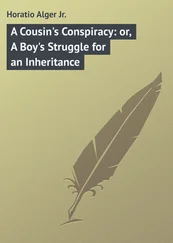Horatio Alger - From Canal Boy to President; Or, the Boyhood and Manhood of James A. Garfield
Здесь есть возможность читать онлайн «Horatio Alger - From Canal Boy to President; Or, the Boyhood and Manhood of James A. Garfield» — ознакомительный отрывок электронной книги совершенно бесплатно, а после прочтения отрывка купить полную версию. В некоторых случаях можно слушать аудио, скачать через торрент в формате fb2 и присутствует краткое содержание. Жанр: foreign_children, literature_19, foreign_antique, foreign_prose, Биографии и Мемуары, на английском языке. Описание произведения, (предисловие) а так же отзывы посетителей доступны на портале библиотеки ЛибКат.
- Название:From Canal Boy to President; Or, the Boyhood and Manhood of James A. Garfield
- Автор:
- Жанр:
- Год:неизвестен
- ISBN:нет данных
- Рейтинг книги:5 / 5. Голосов: 1
-
Избранное:Добавить в избранное
- Отзывы:
-
Ваша оценка:
- 100
- 1
- 2
- 3
- 4
- 5
From Canal Boy to President; Or, the Boyhood and Manhood of James A. Garfield: краткое содержание, описание и аннотация
Предлагаем к чтению аннотацию, описание, краткое содержание или предисловие (зависит от того, что написал сам автор книги «From Canal Boy to President; Or, the Boyhood and Manhood of James A. Garfield»). Если вы не нашли необходимую информацию о книге — напишите в комментариях, мы постараемся отыскать её.
From Canal Boy to President; Or, the Boyhood and Manhood of James A. Garfield — читать онлайн ознакомительный отрывок
Ниже представлен текст книги, разбитый по страницам. Система сохранения места последней прочитанной страницы, позволяет с удобством читать онлайн бесплатно книгу «From Canal Boy to President; Or, the Boyhood and Manhood of James A. Garfield», без необходимости каждый раз заново искать на чём Вы остановились. Поставьте закладку, и сможете в любой момент перейти на страницу, на которой закончили чтение.
Интервал:
Закладка:
"And how is James to-day?" asked the teacher, glancing toward the bed.
"So well that he is already beginning to make plans for the future," answered his mother.
"What are your plans, James?" asked the young man.
"I should like best to go to sea," said James, "but mother doesn't approve of it."
"She is wise," said Bates, promptly. "You would find it a great disappointment."
"But, it must be delightful to skim over the waters, and visit countries far away," said the boy, his cheeks flushing, and his eyes glowing with enthusiasm.
"You think so now; but remember, you would be a poor, ignorant sailor, and would have to stay by the ship instead of exploring the wonderful cities at which the ship touched. Of course, you would have an occasional run on shore, but you could not shake off the degrading associations with which your life on shipboard would surround you."
"Why should a sailor's life be degrading?" asked James.
"It need not be necessarily, but as a matter of fact most sailors have low aims and are addicted to bad habits. Better wait till you can go to sea as a passenger, and enjoy to the full the benefits of foreign travel."
"There is something in that," said James, thoughtfully. "If I could only be sure of going some day."
"Wouldn't it be pleasant to go as a man of culture, as a college professor, as a minister, or as a lawyer, able to meet on equal terms foreign scholars and gentlemen?"
This was a new way of putting it, and produced a favorable impression on the boy's mind. Still, the boy had doubts, and expressed them freely.
"That sounds well," he said; "but how am I to know that I have brain enough to make a college professor, or a minister, or a lawyer?"
"I don't think there is much doubt on that point," said Bates, noting the bright, expressive face, and luminous eyes of the sick boy. "I should be willing to guarantee your capacity. Don't you think yourself fit for anything better than a common sailor?"
"Yes," answered James. "I think I could make a good carpenter, for I know something about that trade already, and I daresay I could make a good trader if I could find an opening to learn the business; but it takes a superior man to succeed in the positions you mention."
"There are plenty of men with only average ability who get along very creditably; but I advise you, if you make up your mind to enter the lists, to try for a high place."
The boy's eyes sparkled with new ambition. It was a favorite idea with him afterward, that every man ought to feel an honorable ambition to succeed as well as possible in his chosen path.
"One thing more," added Bates. "I don't think you have any right to become a sailor."
"No right? Oh, you mean because mother objects."
"That, certainly, ought to weigh with you as a good son; but I referred to something else."
"What then?"
"Do you remember the parable of the talents?"
James had been brought up by his mother, who was a devoted religious woman, to read the Bible, and he answered in the affirmative.
"It seems to me that you are responsible for the talents which God has bestowed upon you. If you have the ability or the brain, as you call it, to insure success in a literary career, don't you think you would throw yourself away if you became a sailor?"
Mrs. Garfield, who had listened with deep interest to the remarks of the young man, regarded James anxiously, to see what effect these arguments were having upon him. She did not fear disobedience. She knew that if she should make it a personal request, James was dutiful enough to follow her wishes; but she respected the personal independence of her children, and wanted to convince, rather than to coerce, them.
"If I knew positively that you were right in your estimate of me, Mr. Bates, I would go in for a course of study."
"Consult some one in whose judgment you have confidence, James," said the teacher, promptly.
"Can you suggest any one?" asked the boy.
"Yes, Dr. J.P. Robinson, of Bedford, is visiting at the house of President Hayden, of Hiram College. You have heard of him?"
"Yes."
"He is a man of ripe judgment, and you can rely implicitly on what he says."
"As soon as I am well enough I will do as you advise," said James.
"Then I am satisfied. I am sure the doctor will confirm my advice."
"Mr. Bates," said Mrs. Garfield, as she followed out the young teacher, "I am much indebted to you for your advice to James. It is in accordance with my wishes. If he should decide to obtain an education, where would you advise him to go?"
"To the seminary where I have obtained all the education I possess," answered the young man.
"Where is it?"
"It is called the 'Geauga Seminary,' and is located in Chester, in the next county. For a time it will be sufficient to meet all James' needs. When he is further advanced he can go to Hiram College."
"Is it expensive?" asked Mrs. Garfield. "James has no money except the few dollars his brother and I can spare him."
"He will have plenty of company. Most of the students are poor, but there are chances of finding work in the neighborhood, and so earning a little money. James knows something of the carpenter's trade?"
"Yes, he helped build the house we live in, and he has been employed on several barns."
My readers will remember that the Garfields no longer lived in the humble log-cabin in which we first found them. The money Thomas brought home from Michigan, supplemented by the labor of James and himself, had replaced it by a neat frame house, which was much more comfortable and sightly.
"That will do. I think I know a man who will give him employment."
"He is a boy of energy. If he gets fairly started at school, I think he will maintain himself there," said Mrs. Garfield.
The teacher took his leave.
When Mrs. Garfield re-entered the room she found James looking very thoughtful.
"Mother," he said, abruptly, "I want to get well as quick as I can. I am sixteen years old, and it is time I decided what to do with myself."
"You will think of what Mr. Bates has said, will you not?"
"Yes, mother; as soon as I am well enough I will call on Dr. Robinson and ask his candid opinion. I will be guided by what he says."
Chapter VIII—Geauga Seminary
I have stated in a previous chapter that James became acquainted with Dr. Robinson while still employed on the canal. This statement was made on the authority of Mr. Philo Chamberlain, of Cleveland, who was part proprietor of the line of canal-boats on which the boy was employed. Edmund Kirke, however, conveys the impression that James was a stranger to the doctor at the time he called upon him after his sickness. Mr. Kirke's information having been derived chiefly from General Garfield himself, I shall adopt his version, as confirmed by Dr. Robinson.
When James walked up to the residence of President Hayden, and inquired for Dr. Robinson, he was decidedly homespun in appearance. He probably was dressed in his best, but his best was shabby enough. His trousers were of coarse satinet, and might have fitted him a season or two before, but now were far outgrown, reaching only half-way down from the tops of his cowhide boots. His waistcoat also was much too short, and his coat was threadbare, the sleeves being so short as to display a considerable portion of his arms. Add to these a coarse slouched hat, much the worse for wear, and a heavy mass of yellow hair much too long, and we can easily understand what the good doctor said of him: "He was wonderfully awkward, but had a sort of independent, go-as-you-please manner that impressed me favorably."
"Who are you?" asked the doctor.
"My name is James Garfield, from Solon."
"Oh, I know your mother, and knew you when you were a babe, but you have outgrown my knowledge. I am glad to see you."
Читать дальшеИнтервал:
Закладка:
Похожие книги на «From Canal Boy to President; Or, the Boyhood and Manhood of James A. Garfield»
Представляем Вашему вниманию похожие книги на «From Canal Boy to President; Or, the Boyhood and Manhood of James A. Garfield» списком для выбора. Мы отобрали схожую по названию и смыслу литературу в надежде предоставить читателям больше вариантов отыскать новые, интересные, ещё непрочитанные произведения.
Обсуждение, отзывы о книге «From Canal Boy to President; Or, the Boyhood and Manhood of James A. Garfield» и просто собственные мнения читателей. Оставьте ваши комментарии, напишите, что Вы думаете о произведении, его смысле или главных героях. Укажите что конкретно понравилось, а что нет, и почему Вы так считаете.












